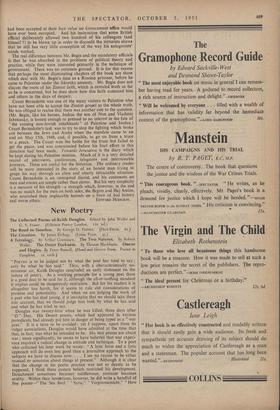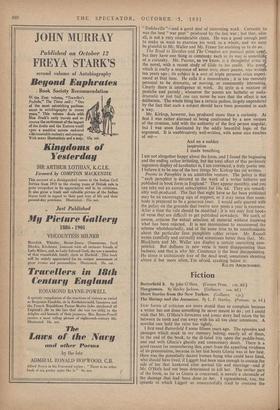New Poetry
The Collected Poems of.Keith Douglas. Edited by John Waller and G. S. Fraser. (Editions Poetry London. I 25. '6d.) A Tetralogy. • By Arthur Constance. The Two Natures. By Robert Waller. The Outer Darkness. By Thomas Blackburn. Omens and Elegies. By Peter Russell, (Hand aod Flower Press. Poems in
Pamphlet. Is. each.)
"POETRY is to be judged not by what the poet has tried to say ; only by what he has said." Thus, with a characteristically no- nonsense air, Keith Douglas concluded an early statement on the nature of poetry. As a working principle for a young poet there is a good deal to be said for it, although the all-or-nothing standard it implies could be dangerously restrictive. But for his readers it is altogether too harsh, for it seems to rule out considerations of promise and potentiality. And when we are judging the work of a poet V'ho has died young, it is inevitable that we should take these into account, that we should judge him both by what he has said and what he has tried to say.
Douglas was twenty-four when he was killed, three days after " D " Day. His Desert poems, which had appeared in various periodicals, had already put him in danger of being typed as a "war poet." It is a term to be avoided ; yet I suppose, apart from its vulgar associations, Douglas would have admitted at the time that that, in fact, was what he intended to be. His best poems are about war ; more significantly, he seems to have belieVed that war experi- ence required a radical change in attitude and technique. To 'a poet who criticised his later work he wrote: "A lyric form and a lyric approach will do even less good than a journalese approach to the subjects we have to discuss now. . . . I see no reason to be either musical or sonorous about things at present." Although it is clear that the change in his poetic practice was not so drastic as he supposed, I think these austere beliefs restricted his development. Detachment sometimes becomes indifference, restraint becomes aridity: Within their limitations, however, he did write a handful of fine poems—" The Sea Bird.' "Syria," " Vergissmeinicht," "How " Enlidaville "—and a good deal of interesting work. Certainly he was the best "war poet" produced by the last war ; but that, after all, is not a very considerable claim. He was a good enough poet to make us want to examine his work as a whole, and we must be grateful to Mr. Waller and Mr. Fraser for enabling us to do so.
The Road to Sinodun and The Creation are poetical poles apttkt, but they have one thing in cotrunont each in its way is somethi6g of a curiosity. Mr. Painter, as we know, is a thoughtful critic o_g the novel, with a recent study of Gide to his credit. His poeny, which is really a sequence of some sixty short poems, was written ten years ago ; its subject is a sort of triple personal crisis experi- enced at that time. He calls it a monodrama ; it is too remotely personal to be dramatic, or moving, or consistently interesting. Clearly there is intelligence at work. Its style is a mixture of pastiche and parody ; whenever the poems are bathetic or melo- dramatic or just bad one can never be sure that the effect is not deliberate. The whole thing has a certain pathos, largely engendered by the fact that such a subject should have been presented in such a way.
Mr. Kirkup, however, has produced more than a curiosity. At first I was rather alarmed at being confronted by a new version of the creation, told with the authority of the first person singular, but I was soon fascinated by the oddly beautiful logic of the argument. It is unobtrusively well-written, with some nice touches of wit—
And on a sudden inspiration I made breathing.
I am not altogether happy about the form, and I found the beginning and the ending rather irritating, but the total effect of this perilously ingenious display of acrobatics is, I am convinced, a truly poetic one. I believe it to be one of the best things Mr. Kirkup has yet written.
Poems in Pamphlet is an admirable venture. The policy is that "each pamphlet is devoted to the work of a writer hitherto not published in book form in England." They appear monthly, and you can take out an annual subscription for 14s. 6d. They are remark- ably well-produced. The fact that eight have so far been published may be an encouraging sign of support, or it may mean that some- body is prepared to be a generous loser. I would only quarrel with the policy on the grounds that twelve new poets a year is excessive. After a time the rule should be modified ; it is not only first books of verse that are difficult to get published nowadays. We can't, of course, criticise the actual selection of material without knowing what has been rejected. It is not inconsistent to recommend the scheme wholeheartedly, and at the same time to be unenthusiastic about the particular four pamphlets udder review. Mr. Russell writes tastefully and correctly and sometimes better than that. Mr. Blackburn and Mr. Waller can display a certain unexciting com- petence. But dullness in new verse is more disappointing than badness, and that is why Mr. Constance is the least disappointing. He alone is ambitiously free of the dead level, sometimes shooting above it but more often, I'm afraid, crashing below it.
RALPH ABERCROMBIE.






















































 Previous page
Previous page